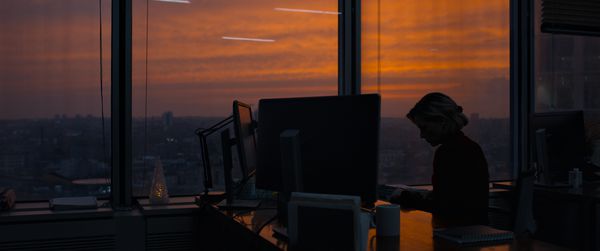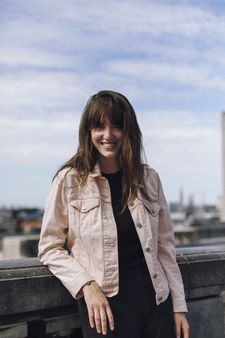 |
| Through The Night. Delphine Girard: 'The characters stuck with me and so for months after the screening of the short film, I was like, but what would happen to those characters?' |
Was it always your intention to use your short film Sister as a springboard to the feature or did you make that first and then decide to unpack some of the ideas more?
Delphine Girard: it wasn't planned at all. I made the short because I heard a phone call that was based on true events from the US. For me, it was the best arena for a short film 16 minutes, in real time. As I finished the short film and started screening it, I had a lot of discussion about it, but I felt like something about the aftermath suddenly interested me more than the thriller part. It had a great life, the short film, but for me, what was interesting was more about the relationship between the women, the way they are communicating without words at some points. The characters stuck with me and so for months after the screening of the short film, I was like, but what would happen to those characters? What will the justice system offer them? Also I wrote the short film just before the #MeToo movement. so I was in between all of those discussions, and I saw that topic evolve.
I started doing some research, just going to the police office in Brussels and I attended some trials to see. And I was just imagining, okay, if my characters were there, would that work for them? And I felt like I knew them already. Because we did the short film together. I imagined all of their lives, even in the short film, I had that in mind. So I started writing this way, mixing what I was observing in real life and what I knew about the characters.
 |
| Delphine Girard Photo: Maurine Toussaint |
DG: It's the whole package that comes with those kinds of abuse and the fact that also we have this opinion of, okay, as a victim, you need to go to the police office, you need to go to through a medical exam, and I felt like why is she entitled to that? If it doesn't work for her, and what is she going to receive in return? And that was a question for me because I was a bit naive, I think when it came to understanding justice and the way the court was working. I realised they are not focused on reparations at all. That's not their work. Wen people explained to me what those medical exams were, I was just like, “I'm not sure I would do that”. So suddenly, it's all more complex. And I talked a lot to victims who would tell me, “I felt like if I wasn't crying, they would not believe me”, or they would tell me, “Oh, this is awful, it's going to ruin your life”. So [as a victim], you have all of these opinions suddenly and this posture that you need to portray, in order to be heard and I felt it wasn't fair. And at the same time, I was questioning,for him, is his being afraid to go to jail, is it not better to question yourself and to maybe recognise that you did something wrong. And when I attended trials, I was observing the same thing over and over again, men denying, because that's what their lawyer told them to do. And I can get why? Because, of course, and I'm not sure if jail is the best answer to anything, but that's my opinion. So you see men denying and victims forced to portray themselves completely white. Like an angel. I was listening at trial and neither version was credible for me. So that was a question of how to accept that those stories can contain complexity, and shades of different things. And I think we're not completely there.
What comes across strongly in the film is how even though she is the survivor of a rape, she's never really the focus, the focus is always somewhere other than on her.
DG: Because there's no answer for her. What do we do with somebody that went through something like that? And nobody says, “What do you need? What can we do for you?” The justice system doesn't ask this question. That’s also why I wanted the other character, the call taker to be part of that story. I still wanted, at one point in the story that Aly had the opportunity to say what she needs to say and what she thinks, and for me, it's too hard with the sister, it's impossible with the police officer her ex doesn't listen. So I felt, okay, to whom would she be able to talk - and I though maybe the witness, the person who was there and listened, and who doesn't ask questions about the credibility, but just, “Are you okay? What do you need?”. She's able to understand that there are also some guilt feelings, but that doesn't mean that she's guilty.
Tell me a bit about the sound design, it’s crucial to the start of the film but also in flashbacks for the mood.
DG: It’s really a continuation of what we had for the short film. We noticed, super quickly that there was something about the sound of that car that creates the tension way more than any artifice or whatever that we can put on it would. So we tried to find in the sound the coldness of this car, the loneliness in a way, we tried to find the element of tension and something that will clarify it right away.
Is that why you had the flashback to make sure there was no ambiguity?
There was a big question during the process. I find it interesting that we see the moment it turns to violence, because I felt the path leading to that was so stupid, like for me, and I know, and I have, like, I, I observed situation like that, where violence tipping point for nothing, because the woman say, Oh, God your doesn't work and you feel humiliated, because she made a joke about your grandma. And this is, and suddenly for somebody, it's too much that it's weird for me. So that was one of the reason I wanted in that case that we, we could have a sense of, this is not about desire. This is about power. We had a big discussion about do we show the beginning of the aggression or not? I don't need it personally but I felt like there's something if we don't clarify that at one point, there will be a part of the audience that might. So I hope every member of the audience that identifies themselves with him, at one point, maybe they can confront their own violence also.
To get the balance between those two characters is difficult. Did having the same actors in the short help with that?
DG: Yes, also because I know them as friends now. I was lucky to have the three of them in the short film, and I felt like it was a journey that we should continue together. And during the editing process, that was the biggest challenge, to find a way there. They could all live in the story side by side.
So what’s next for you?
DG: I started writing a few things before I shot this film, but it's my first feature. And I felt the process of this one changed me a bit. And also, I know now the intensity and like, what it takes to make a film like that. So I'm kind of reevaluating at the moment what I want to spend my next three, four or five years. For now I’m just living life and observing.





















